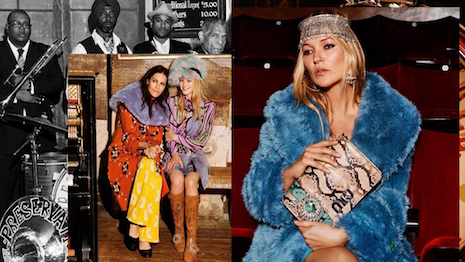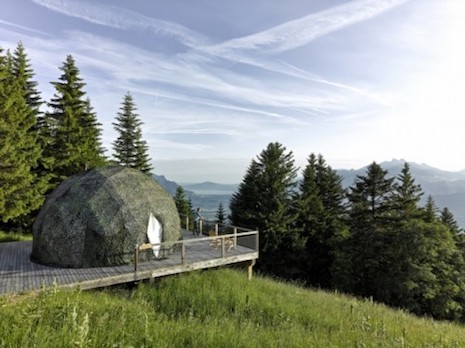After disrupting services, luxury goods and retail, wellness is becoming fully integrated into categories including fashion and fragrances.
More awareness has been brought to individual health as well as the health of the planet, making consumers flock to brands who incorporate wellness into their strategies. According to a new report from the Global Wellness Summit, “Eight Wellness Trends for 2019,” traditional sectors that previously were unaffected by the wellness movement are being disrupted.
“I think that what is most eye-opening is how wellness concepts are remaking huge industries we once would have never associated with wellness, like the vast global fashion industry or the death and dying industry,” said Beth McGroarty, vice president of research at Global Wellness Summit. “It is shaking up categories beyond the traditional markets we associate with wellness, like fitness or healthy food.
“We are looking at everything in our lives now from a wellness lens,” she said.
Wellness throughout
Beyond just the athleisure takeover in fashion, the coming years will present an interesting opportunity in which true sustainable and ethical fashion trends will emerge.
The growth of recycled material in fashion will be significant, including clothing and shoes made from used material such as food waste and plastic bottles. Currently, the vegan leather and faux-fur movement is becoming more on-trend than real fur and leather.
 Supermodel Kate Moss wears colored faux fur for Miu Miu fall/winter 2017. Image credit: Miu Miu
Supermodel Kate Moss wears colored faux fur for Miu Miu fall/winter 2017. Image credit: Miu Miu
Global Wellness Summit estimates that if the fashion industry does not changes its “take-make-dispose” strategy, it will consume 25 percent of the world’s carbon fiber budget by the year 2050. The group believes that this year will be the year for radical change, where in addition to recycled material, 3D printing and artificial intelligence will help fashion become more customized rather than mass produced.
Overtourism, the number one issue in the travel industry, could also be another matter tackled by wellness, according to Global Wellness Summit.
With more than half of the world’s travelers only going to the top 100 destinations, these areas are being greatly damaged by the increase in traffic. Experts believe that if consumers shift their interest in travel to wellness trips, which are more often tied to destinations off the beaten path, the over-trafficked areas can be saved.
Meditation is also exploding, much like its yoga predecessor, where a variety of different methods, mediums and forms are growing. Mobile applications, unique classes and more are shifting meditation into a popular trend.
More doctors are also prescribing patients to get back to nature when feeling overwhelmed. The detachment consumers have today from nature could be significantly impacting their well-being.
 Sustainability is also an important part of travel. Image credit: Booking.com.
Sustainability is also an important part of travel. Image credit: Booking.com.
One of the less expected sectors that wellness has infiltrated is the fragrance industry. Many consumers are interested in scented products that create a positive environment.
As China continues to grow as a luxury consumption powerhouse, so has its market for wellness, meaning that its consumers’ interest in health will trickle down to the rest of the world.
Nutrition is also becoming more personalized, with consumers looking into medical testing to determine what exactly is the right diet for them based on their genetic makeup and sensitivities.
Consumers are now even thinking about death and burials in terms of wellness, looking for more sustainable ways of burial and peaceful departures rather than cold hospital experiences.
Additional insight
Wellness is a particularly important aspect of the luxury sector and its popularity is continuing to take off, with the industry growing 12.8 percent in the last two years.
An earlier report from Global Wellness Institute shows that the industry jumped from $3.7 trillion to $4.2 trillion over two years from 2015 to 2017. In the same period, the wellness economy grew at double the rate of the global economy, pointing to opportunities for the luxury business (see story).
Consumers’ shared desire to incorporate healthfulness and eco-friendliness into their lives is evidenced in the topics they talk about on social media, with subjects such as clean beauty and freeganism rising in popularity this past year.
According to data from the 2019 Topics & Trends Report from Facebook, conversations surrounding sustainable fashion have grown more than three times over in 2018, while detoxification as a term has risen 7.6 times. As marketers prepare to launch campaigns in 2019, Facebook sees these trends as indicators of what will soon reach popularity (see story).
“There is a sharpening urgency around climate change and the destruction of our planet, and the crisis no longer feels like a next-gen, won’t-really-affect-me problem,” Ms. McGroarty said. “We see this urgency in the trend of well fashion, where there will be an incredible surge in more sustainable clothing, shoes, accessories and super innovative eco-fabrics, as the fashion industry is an extraordinary and surprising polluter.
“And we see the ramped-up focus on environmental wellness in the dying well trend, where, as people become aware of how environmentally toxic traditional embalmment, burial and cremation is, how we are seeing some seriously out-of-the-box, eco-friendly burial options,” she said. “And we see it in the 'wellness tourism fights overtourism' trend, with new off-the-beaten-track wellness travel destinations that will help alleviate the environmental destruction happening at destinations suffering from an overtourism crush.
“An unstoppable trend in wellness, given our serious and scary anxiety and depression crisis, is the focus on mental wellness, which we see powering trends like meditation going plural, the new use of scent as a neuroscience-backed medicine for our mental and emotional wellbeing and in the prescribing nature trend, as the evidence indicates that time in nature is truly brain medicine – impacting everything from stress to cognition.”
{"ct":"SAeW3cG8N8cF84Y\/2DjQVcRT+vSXzIuvK\/zWhQ\/ChqSh+uIwtY4Gu9G4gIaOs80ral0wyn3SblDgLDPKpJFu2iHaybxR5Nyp5Dfwodw3fwaAEXgwTFchrVGj2vAbW6eO4m7b8WMFNInSCHidmfVX\/PN\/FBTeWJSam3uWfqA7GpRHPX2uRTQ\/reVqoBu2YcEo2SSrR0dZx13JWBkpnGzkhb+N7KtBAhT9XPJpomYzJLGttYOweLl32YS5JIPV5orQbKyhQULEBIsK0uquTb5lG\/dS\/TG2Uzc0+VYK7HwH0r5OdezBf7zqpTClNaDr3lD7ZbBJjtJ9aH6rBLx8s29\/0o\/1H0qgWE+kxflpbbG6mCbJPIdxUkq5j+JeH+cZ6ri5xCJ5OJNT0ZIlUMR823k3Ex+3DDEgj+nJgLuTJgRrxaFByGNlq6aEo\/PdpxPSQbjGKqJXz\/nHJoHBpDgVJogo\/0teaSmz2Mu4+xZZcTrVFo3v8KN9qepYL1xUZa6tuwJ6RlapwpVS3dVA3FhjlSdBfAGNKkIf1ba28vVhRoWTobpf+WdTlHyMfEpU\/3nxeMNmrky6FnN1jw\/AKqRPeCyraOeJzloyIfwXTrF7rJe5+LXevVtSAKdAbZzEi74qIuPe0U+j4t1f1jgDJNg8V5CGWDjnui1GM4Jwda+ozlQwuC\/aOx63+2gcaomRkFCleNURvU7SBwXOwiGd5uzWWdnvIS3ZUa9oegwTAPewetkhdp4tfaQHmzbwtt03rvQ3zZmc2zBkaIBSVNma2VirpiABsqpecFgDkSrC6NwhOFvq8qttFzUPx8gEim9StN4B\/0R\/jlpuNpl39hAVu4W6Nw7I6FUJxeBRYzbkGnj\/v2DRwk9nWWg1IU8PawwIbpTxXWLSQABMhcyg8fiZwsPAwX0V69mc3xEgxWBi+afofi0a70XEpbMWkvvke2B2xkrA\/NOfCLpMYykjrZoryrcfBFwyAbQWsOIyYlCXn596z07SYSi55zlkfKRUHdzZUqn6zW3746CWfMtUIrpfZBoUgpmkoWvgosx+0+5EtBOitQ2mRRj2+G4zvAm4HnOFE+9QcIS6yl0El589T9+ar+maD2ULAaHfCdcxYamBljDp\/4Q85VQYSWR4CN3sbNdjv303r3ngrNuQpBwg4x9alqwxkNnc6QgR6MI3kD2DWT1eTi4Qrvg6VGirjfZsVfHQKYzV2RbZdoeL+UxkTQW8ZUhkChn9PJlm53fxO2AMvBV+ySLvEddpuUlEVH+EHO9R0W0aPQK9onJNoSqOo4MsJK2R0nbvlvTuA2vmLzLI5qC6Z15I2Z9WR7OKnSIeK4OWnsMlzgtQ8QI0kRxpoXRcGIBviK4xzh81u6lOSpTfXQNtfsg92wHkJ6uFvOESoJ3GlXSaXRVE8+9TAStQj\/2amIXem3KO7r1iXwFk3F\/leX0yRjtwZrEjRKBXNXheIT2wk6IYs3GhNFOFVz3FXn3ogU\/F+BjI4Knc9CYK\/mt5vIYOq0VgJTfP\/WQHGBeoOHLTAQaIONNLFXFwJW0qEkhPGYrrz4ayUqtduMr27GjEHScreHqrQx1KH01wxb2zAjeahKV0tg4L\/0mXclHI3vFoBsd+eZvjxzTQUtB4TmzxheLk+MdynYGNcgKbIfhXn8IN5FhgdwSXRPPYK3Cx6rs\/EqwXxArcHtp4Wz8haj2NtJ1AND6RmJJC403X1Lm25Qv+v+xk043RrmwLcEuURP1rdffbTdz8DP4UgOF9bm5GbxlD1nqsTYrxyb8OnANthDSEHXw\/wmYHhnLrVIcD8LOgRaTNkYkLzeoiWHTHQkfy40fGVxzFtiXCvLdiK\/i1cdeoxallnZCXCqiaQ0cecXzoIVJ4+oY7UdbFo\/QN+vu8I0XutuGZz\/PM1Yoon58MNGJSCFFGk6Xh9q9JEIfa\/jZfJDw\/bcROOxcW63AqSp01yulmtXcwZhOuTnLTSWzLSSa7dsJsuiy\/7rRPwcOcya4kVEUu1Hw+PHeqd5kPOv4M6a\/P6egthALXD9YOF5Dms0Qplo35lbrMka0LlAVBbudBuPkuTykmazeIKlW012pJ+8qHGS2OjauuWXnLfXzS4Eb\/PvSqM4lMfYJONu4j\/DTnzv6x5dyyURo5FD5bE0xuD9SwG8CGCbJkEOTlvjxlViWQCeDSjgRnbUtcC+Y7iEnGPcx0iXXvM4+OunIckGk2YyAXzCTAOCmYEccwc8L9je8y2r29iCuCgpUDdyjTccyOyhQT3y5\/sBPpQBIZXT\/U+1VkmgckGqx87JXnKgpP29TgwOPzmJFNhUuVW1vS\/7HyqFxsdLdv45cc5\/KhL2BLd2k9X2w2pirMjqDMRoQ9SokQD08QEpcP77g\/LtTwUCV+D\/1UBlTXTo6Qb4SkkG\/gXv7OCDPFZ6r2FIBv8N2hkP0Np7ywgkwH43hn4jsFr7WyOftqlZmXg3mLLwWD+1PMUFqHv6NURjWgtsYZc31ZjWQTxAXpmKIqjQhkN3cwEooW0ONw9BrMD+Tp612OhZjq8gVJOuCSHAYT0uQ9fFXBRqJOajcPUDNwH2TCz4WFdVBnALec9kr9a8B\/4rNsExxW++yjvpRhSMwdXiLUtiy7VchPcibyf6smwpexOtW7KDDVzPfjJ53iGUZWqXw1654xjbvRyrFw2BMuIc27QhPxaFm2L0I7BBCDPi6TWfzWcXjTIJKLqURjIfNfILAL0iQDAUoT37i\/C6T3JByEF6KfdENaJz+D+5BcvqRZiN47QEGbc9Ned1Y0k+BOHO78\/NZdVYkteH9NmKg\/Y16A+sjc9hzmuIOVb9Atx8I7rAcEqmPMcFysog4H9Fw7T5HfZpbg7bk2PqIoDhCwP2+pElP3z00Af9fnwWkl3aazsu0VC64emy6Bc+3NphultwcMEK\/TJOktFPcFlkKiKpR5W3Op30rK5NAYMuF2lvJHtAzRA5gCeJbRhcNTnyma2rBS4H7zzwjPEJ+xHV4XN9yiSjwR5cAnOV6cKiruJzp\/MQt4ZaPhRh1GiFUZUuPiCbShgWbtn8E\/NBcGplkbYRBvOzPeZTS1G+HN2oGpCszIZDhs+HQ9fLPZcosZR+m4zVZOApkfd5+zpZWz8xjxDJfRZM4oTN\/4rMS7EaSbYTm61I492Ksa2B2XgwwIjewKJDo9i4vYXjN2cEHR1rXU0cdOG3ZOp6a9u0RawbFsDQNsk+tGopZJdBWawAFbtv4nou3X+5v7QqyE3J46AJ7xWHm1Ftt7qzBuBR\/tMcgvU3cOlkflx6+ejW9WPZR05Zoi1a5YA1ub+57mE18AasQDiFnqnrbploFaAkLivGVZHCfdv+j42mTGqk5cTye8\/foaEza\/knP1I1Yc1wdQCbFprDDcpFC\/jHP7yxBmqWGSELmvPIGnT\/DqyC+qrho\/S24qYz4svXKcEMqgi+GHCLMIVGrs2C1HpAvsFccNfpj++Dm+Lf5FzaDZmZRXlYGH+RHHRwOaCVa+0toGtZYr\/rCcxKUprGOWtYR2JHuW\/xujrjqoCFFG7WnWteQ5nJGsMUh7Txb8cvs7wyeopgR08cWvpY2vXbO+dV9oNnNZfm5MNA3DRCOErMe5xGE5LklZx2aejSF9V0NSQcQVFR0Q4zo36e276X3ZZN3OyNqNLeLjAfzjnBH6nR2vjoMRNrNHClczZ8N4aqx7+E\/apcWVS3QFwkYOBo+SCAmNQGUUnYYs7l5TUWwxHe2pBpyPSKH6St0V1WpM+wMNx0kKrHBHDlG88O2mHL+Bwj5KswlXbBRepxOAbJd4t0U7q+rql+sbVhQT1p45M52UH83BlegFdbIgsLVRGMpJomnbiggCC4odQAWRdlXJCa9tnHh380GFcDjRak3cx4xsIfhUapRzw9pRV22\/3Tyq9xcbeBDopcv5hciRpwWD86KUHyRVSCn+wR4HuVQ8jcb95L7KNl+LWFec3DKexNR1Xp35Vl4iwXj\/mIznnhBBC5hzao3QTAQyB+kIrwQUq0WxseD4Y\/WOvNO4U9uWa2b2qq1\/6kYft2m0spc\/T7UVlEP2rOHGb0bCEjMKY0cafBH5HfLFD7gNJz8cWIZt3P\/rZta3UmTwts2tQ5\/ttVPuTFFVyfYDCUf4syfwImesePAco5ihgInnZquVASHnd6TKs34sKZhYCNXXYuvC\/Q4Zq+mvbuijufPImZD8Me3Mz\/R5TMkAUIyMBfgBMA0V9Y7+pKrJqhbKNxur4zCpQ31JfxTM\/mW4yC+x\/AcmjFR7IPDkWvM2rF83J6blgLvSq9IrE0ImoPcPVftK+TU+fmXefMuteijfidHrOiQW94Qv7fFW3xFLQudfm3uK7Rs\/GAR6iTPwq5klUe4RnBGWrg5D5YsLmshe0ehDtQnn8O\/mD2dVUua7Fmd6i95XIXNBEb4MIEc5aQlAv4U2bgYM02QzI6xSUEdexBm6aEiDVz6PgkPqnPd1UUgCeKp\/pkkyJ\/1uiPtwvIUwKnMl86dEpUI642tqiZTFMvzJCJESLj8IlhwyTup5s0qAi4DibOHbQ1sXzPX9GuPYAAGwTB3iue5fepY5gfEWqM3kWYex6qi1KiAoLg5T8hYtqXd2wbOWGAH3zF8kckQ50VPfAIs3IpsNU\/e+0f7D7HKKlwtBzW\/Bol0fdCYx3qHRfEnuNZgsxyuUefIU7KZk84C50NSukYk65IpRBxViZMkgP6FGtFZMQHXyjnYYx00qpJxpTEuyJ4+1ehxeWHYaCAsRNILceIsmysT8VZwVgEZBHEzejo\/hkSedm7mZmRWFM+\/z3sw6yb90YvYPx2Z\/stEAaI7yT3NaDGv73AgQFPpb9E7uDq652rRtCP2\/qfLFWaBvFjl9ydDP5xn7A7P8okvW7\/o5qsB1WmNZ4JFHD0S8yVUUQU4V9GGkSej\/xi9iED\/7+m0hQZGOJmMAEb6+JzsSaBVsYwG4flrpioYG65pKBWLrTZeBnPtFzpqYEr0BCL\/+yXV2XYreo8iAFfz2qWlBcSdsavtOWSV7bHCT8KzhW0C7gAAvwCBvn9bpHZOFcce+As9yH5g4NQktqigjUNSNVZJPKjVQfOMl5IupMH7k\/VYwTWdUFb6L1OxjGD\/XwPlrbZZFGy\/2DUBr\/tBrtl7uni9eTfB4hPGWSX7o6vMYmGL2wljmm0\/ivV7KBFjCOlVrRtPaedm3iDXBMBF5yEQIuLxXV9LSezHvSrFNS7xS2wYRP5O7SK1x1cOzG+yQSUXJFN1OQ1CQa7UwrAdL4xA98O0WkiOMFB3nhtMzmZuELRpFDSBa3TvfYTH71SjWiXPeILftU5+C5o1pQ9I69FpPo8DVTqFgjAdB7mFq4XGjk0yIMh\/RGuqAR8c5p\/xMh5Nr0iMUkzTJhWnF2XW9P4pEw7g1u4lKfEoaYCtTn0O1qqoRQ8lxZw7uEH76SpKSoAJcTlGiftUCEgquH8Ug9FM\/utKgyhPvx37QPum3iy6PfoDolUrYAKIys2kwJIftyIChI79ZFa3ZUlsQjR4qbPZcxSbiNXRZGpAZEsRwKSh411C7M6jXJxJxsa6bU85kL+3LEhddvL+IJEoJWH4vMu7x+V3gXM0qAovr3v2e290Ex5cnE4G8tGlcSqLBd1y2MfLrKyFuikHlFtFSeSbx0G2zAKI3pX6VboC9gjK9aNqsGCS4Sv7wEJzd++LY0SLOg4os5TxRd4d7+QGZ98onE6QbH1HkC4zjA8KV+AdzqAfeHQuoOgrf2XJYLay19wwtzFqr5ddbRklR4wqoKDk9Qo5SYRqNeP1e0CHJkQd2vtlJNH9jd4RDdS5J2dvwdOxPfzSvLiLO8XojA4IAq1ZcGQpo97xdzokMDyrLffyQYwT1nTenrF0vCiDJ4XNyf7PZf9RYfLqbEn6b3U9WOjfuX+7QjsPVbp0qKyd41ngltmxmZz3NczyAPTwnItHmzCDp8cnGv0RnTrFzHoZS1QoJhfYK7ahLxsL9z65As5lJRV7GbSMMLADiYQaI7fFO4jVGuxQpeYp\/sBa7+7RsuqLEgoAISEpmhTHL0uk5GCsnvAEQEm1kIIXzuHF43+HzO3yldnA6Xg2v0T7Ke8D9KgbNO87K6LASGDM\/rvdiZuxz8V7r\/C3Fh9m1mZVYHVwUfzW8e6OH32GBPLzZ9T6pta8Nvhg9LNjPKp3gQy93SWuLYHpZLH5x\/eYNZPetEaLGrYa12HvgbEqivk0d4ofCEAjYEwofCUIykO7GRtFi2ybPbqo7pKQRFpEaWBm4Ma+I\/W3vL0faTWeFs0V\/XhaxI7+CR0UZi9N9QWa03k2ViIvTIMY5R5blvyKUhyq5J1eoX2FE223YTuEpiQkwq3H\/bPFx+ZUibWA28DOIf56VpMV9aVEtZ+iW8bOUaDq+HmiWiepXX5SjjY+eD5Cx52Ae2qAeEJYMAN7kNJMHkj2hYPAFtQLEznw9\/vNHD9R\/dB28jE\/O2UdrEMvQSmx4GZM0A7eoxTYAhpnWBrD4wy\/\/DBcoBJ+mCZelEY0JCQfRwdyaYKtI712B3iVXAtUZ0dRy7lQhPYzKYpTTZmtROBkGCDSFaSmbuPtlnIAnLkvDQmDUgOq2aa22BteBEzasCG0\/JQT76Ck0y4aOXVX5LrVjg9A9Q8u\/CqTxOcsqacvVi\/Ngrr93ntC6b5OFpI8vouqdWeSb3GzvWS\/MPJoWxEy99\/RedqiBsniD1RwQw4kj6QIzr09Z+FWIIxVyfifGiMN7INwegYEnF6t49tYDQm5XbJNfY9iqHQONqnjMXLn1GqfyfR\/FT5Nl5UesS2D+Q2KT4hkxmAiCG5IjcHPu1QlAQEnxbvnsHlADliduTDf1SrgDd1nOJAuzKCXvgNulWYGikm006eJ7RIlRZpJeBMJEiRyqpGoBbY8MaMJ2RfWVyx+9NUUl47e8JsOfi6nqpDrr4dnT8CXlySfiZZJ8ZkP\/mQAFBrABlLPpmY3wSNOw1I0MjJf6i9sN2eQXzvZFl5Vt7aR7mhl2AXKDeKiYV9Eez56xGbf6lp0K35nTyI9MYRshj8HS7Ds+sEROUWS\/KFJTUDJ4b7JqWeQTUcI9Ka86uVhddRoyQyDtLORYUNOGMNS33Fy8b7HfOgUweMSOhf3yHmD1yrAUIO8YuQ2A+PPJZdpZuU1VF36SJmi8DjvXy\/7JChLHlEckReHZcZebu\/Fu4oeW+PS3Y0ivdoRHKobQ8EObQBmR7k7IHp1QFiruwjOOYe9pykVBp3PwWWFmoyHE6OxCKyvE8RWANTI2tXCuzLm9WCUsau50mAMxxzPXzJUjHwk5nRRJrpoRQjDlVh7VKAe6rWrBjWoFaZuJBlJVlydmovsrfE56ZFa8bPTRaVQ0SrmpEMcNPof20jP1s72jIIeYF8vZyXdl4pCJw2Zpvzg9Oqo3h3Da0jMbWWf\/v4pcULhLZen96GJYK4iyS4B2erJ99bxl\/7ifxOKaH5Zi9H2UOenkbXWHe8b\/OC+U2NgYOpaFKV4qArTjt5gRXyZGP7yp6uOYSoyBQrIOHfruvbOQ0iHUS1FSDgQoOMw0FMesGuZmhBgenqghGsJDDcKiPS29Pa0UtQGdQsk+0U0WFV3cXvV0N65O\/fHk5We8Vm+bPvrNXKXlTKeYVq+XvWjdqbN0lN7UXT2ErqRlHqvZTmkoD1UIZanjwnU5TTwC1bu6rrBaP3m625QEsN9iyg573FravdM8PzkJ0td3ubHx1TaGjNg1CXv1uW8mib5QZ0fL5lKj3rWdmZ1F\/pVKrHd3CsjWcsLbr9KY4KELrcPfyEP2O4cEnxEvfcFO498DNmbdS7A74lb8NXL\/Z7qVYeTTYZCEVtlGdApkBlDgqC8s4kjJOrl8ey+1xuG3GSTDCisyJ+D0OtWN2hOVxWO0OcXhgpGOmLbeowJtuAJ2ZVXir47EO3k0SJubdv7B3R\/leEHY6qSbejfbSGQN5mLrtqTDpG1gpk+2TNOWCgCGRqZy81dcua7LfpN4NVbj6lETLinehjpTlRkJWLIV2uc1Wf7jcRWNqayjlF9mAwGU4ZACYb18TM6UpK95JLV7gOfYu2cDhVATkWsHAvK6JnrxZZlmvEXvJIBVVe4iUZ8ojWU7My2C8v6uewLPReb8YJHiJVqlU3RP8TB6Yr+22y6mjGXzHL4RDyUF\/na3F7KcYnhd2qEeeNhN9081vE8knAl+H4aPy8v\/sUF6zxnSE4LUZMP4PyStGuL6\/oRUdFH966IfHYhKHIE+0+9ZKtutB5ZmYSWoUyIAK4Ydm\/AHX7S1\/+Qnx\/glGhd1YyC42+Mwlrft3jfZdaIweA\/KhVJjK8Bp3CFHhg2X9vQkSwBqbEA6iFPicXRT8IdlRPgFiH+sK4UWY0KIxKCstmsms7B+7c1LowT5tp7dF5qFV8y5oMRTrYOqL57\/t3aRjLzcqY5WfMfQkJwHwbCJ4zaj5QNyjAefIWYNf8qxzdiV+L7MsR1brfem34g7BCItRAVIrw0OCDMmM5En8uY9\/THasjTzRpyxK\/qYgoDQ38U0RK3bO8gROvvpEtiHfigbYPZEV6QivW1q8orXkoyCrAIXF8hOLUzcJi8hpiyji\/zgLBQbyO\/GlTajF0lZ1eNOXlMBU7giuvqf1Z5w6TWDINQicYt71YYp0zbX3FzeXBECfS81goM\/DExnNIL7mX0IAh8K5vqKvAyMjEBj+tLzbUci6ewGts9cx9Ra06iU9WynzlHuLniR6SOu8PlcGunp7mVVvoI0ayqhOOH+57J8q5ddzC5dBevPBUykOcvlcGalj11omozR10b6bVNO9PvYRnQlD7ODBoECjGnVTCTwALrIjUMASMB5j6ym4GYItxuRALPFqLFvgvsBHcmLZTBH50fuXeUxsX3RLt23RbHm1XjyxPwaWqWD6gTWKZRgtqWYoCqjWDbefs\/+tDA7\/7Bww8WK7SpINXUdJ8OpmYFuqY0SnNSovk1BmCVkP2gi5T0lVqKflSiGEHKjF18eOCjv\/gC1kxNSWTFYMBam0u6KWmmmNicRnqS3ILigCoZj4QqfA1RYwO7+7xkz+nA\/dJRHf+gga12bcv6cREdHUz7lROeaE49m8BgksT0LHOZmanaovYA\/z4Xa5\/3MA4WVz5Rt4Hf8UC56NOy7LbsXiwGI\/l46oPkGqhw900Y0vT89L4y9rvvbF\/Pt6U1\/rzIJlyEpG97l+sUIFVEl+v90t+EI5seYA58JYt5r78ZT1SgByKu3Vzrvl8K4DU\/R\/gkb6TgrCsj6F8fHQVs3aUbeQIUgAjtghj7EQRMJ4XOla1ztHTMgWOjwdGzdN0mgcSS5oLiF2IcmsycAFAE3N4jOsnypqGpveOED766ftjiPa6JuOVE1nxgzWuh+FuYL3LbBP4aoLruZSEaYmHS8\/sSHxNooh3n\/c9CwmnC9z1yfeBhMaGsGNCZmQvZGlda7k3HLmC9pf32wr6z2CkG6It4hi7JF2S0Uutwb2BK++g748rHD1DRcJHePyuofNS5P2lAzG5c3OS7WtH0E\/XrVJyTH1HB8U2SkcBB9P83g2rOIHFiRtQY+b2yXBj\/1lxwMKmWk5ghZDU+3m70bSsv7Lr3zgV73fiyluBtKqdQa\/H+2zoxeCLvyPec9rz\/19kcnemUsUJqEqkVQjsPJlN01lussHurPyE2BsOgwBU5qUiH10tuQ4HbX1hR8xOxBpJxSTHFxgciuTqo0pjt075B0FgnuwsEzLNtXHNEc3XrdoLcT57jFLCFvEECv5NLGS2MZcK0fhRP+8WQgS6DkwFa2k1SL5LL6MIdswNFXK230OcH\/grK+1V6iTMnOGZtFOGaI\/ebpOjXdfG3\/meN8mh4Yk0fFM9Jo1QfdkeyYWFmyD\/Jtm5AWvDiJjWnHMevIpfSc1cCPUrFnDDl3Gxyljchuo3EBBbJFXCECz0wg7qYl\/vu+V80uq19VcnKeslRFTAyF+w3Fn\/sga2Rl1RDNmRKOBQB30urhVXNuWkQg5U7FSbHQbmXNhADa8chwh59lnJxW8QY6ht13iBH7cHyrtx9ghH6WO\/JfOr4RHzhGMcaU1HHvwSHskdK2RhPPwESCeBA5Wi3t+Gi3ISK7AR2\/ZDBWisYAGiUR+YTAcqWoggkP5sBdh4aofWiXOLlCnS+BzeguP7BW7vPI4sOSwMnBcNaOhAMmnJd825u6rxhYaxZLwd25XFc\/geqHQ5Xkuvi36ouRWLjhy4oz8nXBTueujAsHd4WBjQIGCRjDQWfs1kiEOihwtDFfzgUOrbcr806dqjLh8eMZLkaC","iv":"8546c79f657a59050fbdcd1509a7561b","s":"7ce65a59d7394f38"}

 Meditation is becoming an important part of wellness. Image credit: The Mandrake
Meditation is becoming an important part of wellness. Image credit: The Mandrake
 Supermodel Kate Moss wears colored faux fur for Miu Miu fall/winter 2017. Image credit: Miu Miu
Supermodel Kate Moss wears colored faux fur for Miu Miu fall/winter 2017. Image credit: Miu Miu Sustainability is also an important part of travel. Image credit: Booking.com.
Sustainability is also an important part of travel. Image credit: Booking.com.